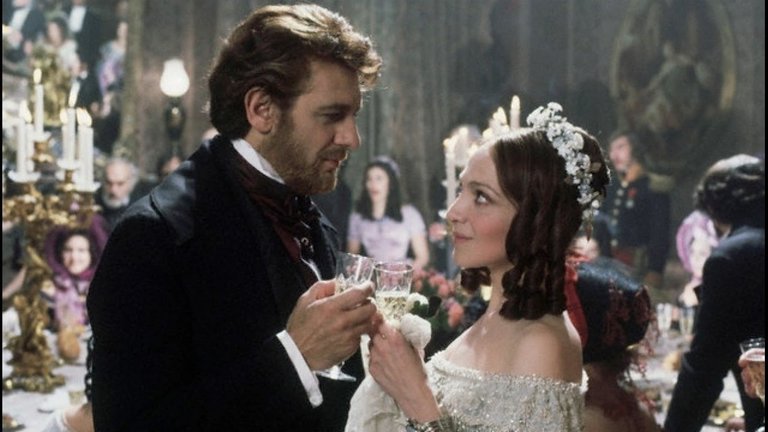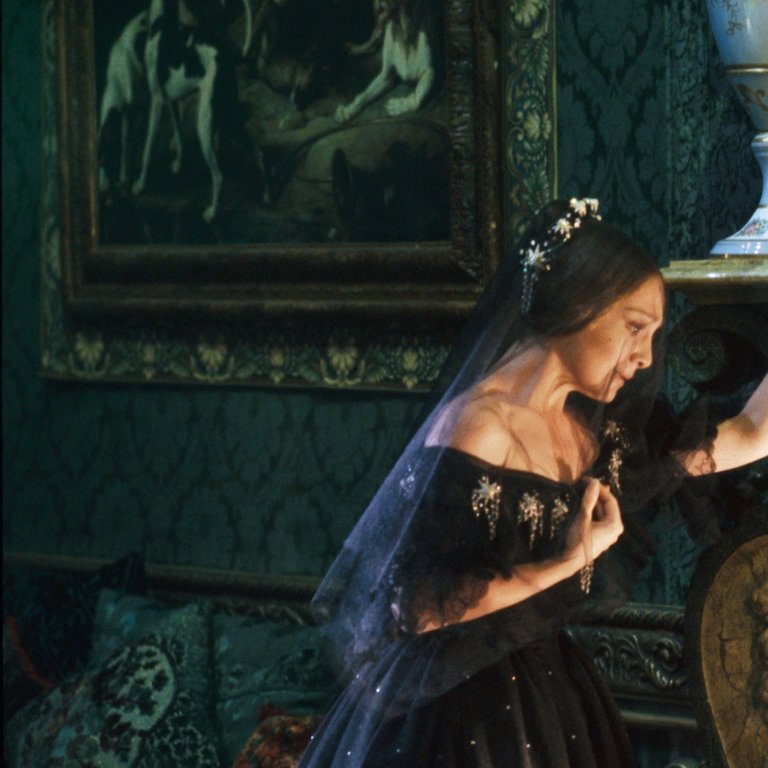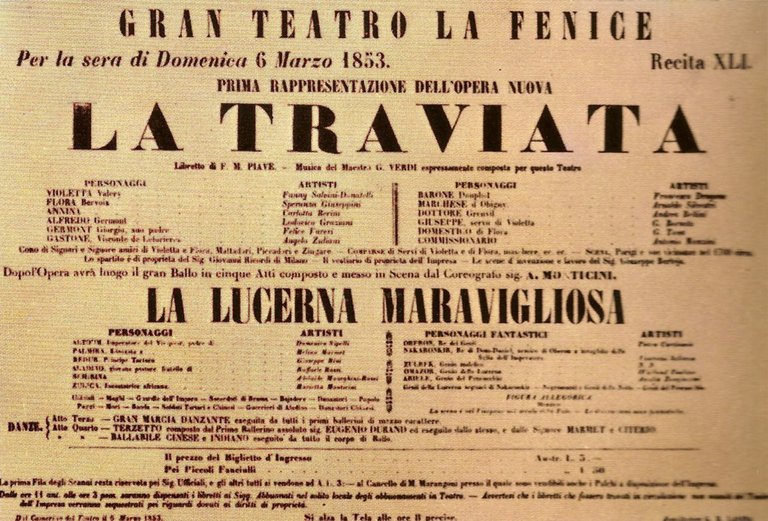The title means approximately "A Woman Gone Astray." The version reviewed here is the one that I'm including in my cycle of the twelve best cinematic adaptations. In fact, I rank it as the most cinematic of all the opera films I've seen. The other version that I reviewed, by way of contrast, is a traditional stage-bound production, starring Anna Moffo, and a very good production within that limitation. The version reviewed here is the handiwork of revered director Franco Zeffirelli.
Historical Background
Franco Zeffirelli had a multifaceted career in the world of performance. Born February 12th, 1923, he began his career as a stage actor. After appearing in several stage productions directed by Luchino Visconti, Zeffirelli worked as Visconti's assistant for La Terra Trema (1948) and Senso (1954). From 1945 on, Zeffirelli also worked successfully as a set and costume designer for operas and plays in Milan. His productions at La Scala in the fifties lifted that opera house into the elite group of the world's best. Zeffirelli's productions were known for their elaborate sets and lush costumes. As his reputation grew, he was invited to direct productions in many of the best opera houses throughout the world, including those in New York and London. His debut film was La Bohème (1965). Thereafter, he directed both opera adaptations and lust period epics. Some of his most successful efforts were The Taming of the Shrew (1967), Romeo and Juliet (1968), Brother Sun, Sister Moon (1972), and Tea With Mussolini (1999). Zeffirelli also directed the popular television drama Jesus of Nazareth, which is a broadcast staple each year around Easter.
The Story
As the film begins, the credits roll over some lovely shots of Paris in winter, featuring buildings and settings that were already in existence in 1850. During the Prelude to Act I, we observe workmen removing art objects from the home of Violetta Valery (Teresa Stratas), who lies gravely ill and alone in her bed, coughing from time to time. Her possessions are being sold off to cover her living (and dying) expenses. A lovely portrait of Violetta, hanging on the wall, has entranced one of the young workers. Violetta rises and walks toward a large empty room. Her mind flashes back to a happier and eventful time. Acts I, II, and III are then depicted in an extended flashback.
Violetta recalls the night when she first met Alfredo Germont (Plácido Domingo) at a lively summer party in the festive salon of her lavishly furnished home. Violetta had been there on the arm of her "protector" (sugar-daddy, in modern parlance), Baron Douphol (Arturo La Porta). It is immediately apparent that there is no genuine love between Violetta and her escort. Soon, she is introduced to the young Alfredo and she invites him to lead the guests in singing a now-famous drinking song. Following the song, Violetta experiences a bit of faintness (she has a serious case of tuberculosis) and seeks a place of solitude, but Alfredo solicitously follows. Alone with the woman he adores, Alfredo declares his love ("The Day I Met You"), in a romantic aria featuring a "love theme" that will recur periodically throughout the opera. Violetta protests, doubting her own worthiness for such adulation, but Alfredo's ardent appeal touches her heart ("It's strange, strange!"). Alone, she tries desperately to fight off her feelings for Alfredo ("I must be forever free"), but his image persists in her imagination.
Act II opens in a country cottage where Violetta and Alfredo are spending joyously amorous days together in the golden autumn. Alfredo's heart is bursting with love ("From my wild spirit"). His euphoria is shaken a bit when he learns from the housekeeper, Annina (Pina Cei), that Violetta has been selling her jewels to support their idyll ("Annina, whence have you come?"). No sooner has Alfredo left than his father, Giorgio Germont (Cornell MacNeil), arrives to plead with Violetta to break off her affair with his son. It is creating a scandal that may cause Alfredo's sister (Dominique Journet) to lose her nobleman fiancé ("I have a daughter pure as an angel"). Violetta initially refuses but ultimately selflessly agrees to give up Alfredo to spare him from inevitable ruination ("Say to this child of thine"). As soon as Germont leaves, Violetta drafts a letter of farewell to Alfredo ("Oh Heaven, give me strength"), but Alfredo returns before she has completed it. Violetta uses the pretext of paying a visit to Alfredo's father, to ask his consent to their marriage, to effect her departure. She then sends her farewell letter back to Alfredo via a messenger. In the letter, she falsely indicates that she has decided that she loves Baron Douphol after all, knowing that Alfredo would otherwise pursue her if he knew her true reason for leaving. Germont, anticipating his son's heartbreak, returns to console him with reminiscences of their old home in Provence ("In Provence"). Alfredo however is racked with bitter feelings.
Act III takes place at an elaborate party at the home of Flora (Axelle Gall), back in Paris. In a brilliant opening chorus ("The night is gay with a masquerade"), the party gets underway. A troupe of gypsies arrives ("We are young gypsies") to entertain the nobility with a mock bullfight performed as ballet ("We are bullfighters from Madrid"). Alfredo arrives alone, while Violetta is escorted by Baron Douphol. Alfredo joins a card game and gambles recklessly, but has a great string of good fortune. Violetta attempts a polite reconciliation with her former lover but he rejects her icily. In a jealous rage, Alfredo calls the guests to gather round to observe, as he rudely throws his winnings in Violetta's face as payment for her previous services to him. The crowd condemns Alfredo ("Worthy of contempt is the man") and the Baron challenges the impetuous young man to a duel.
The flashback having ended, Act IV now opens in Violetta's darkened bedchamber. Violetta's health has deteriorated badly. We find her reading a letter just received from Alfredo's father ("You kept your promise") in which he expresses regret for having asked her to give up his son. He informs her that Alfredo had wounded the Baron in the duel and had to leave the country for a while, but will be returning to Violetta soon. Giorgio has told his son of Violetta's sacrifice and Alfredo hopes to beg her forgiveness. Violetta fears that her health is failing and that Alfredo will arrive too late ("So closes my sad story"). Outside, Mardi Gras festivities are underway ("Let the beast pass by") as Alfredo arrives. The two are joyously reunited and together they express the hope of renewing their happy days in the country ("Dearest, we'll leave Paris"). The excitement is too much for Violetta, however, and she collapses. The doctor is summoned and Germont arrives to beg Violetta's forgiveness for tearing the lovers apart ("Ah, Violetta"). Violetta gives Alfredo a locket with her portrait and asks that he pass it on to the woman that he will someday marry ("Take this image of my past"). As death nears, Violetta experiences a brief exultation as she imagines herself back in the country woods with her beloved.
Themes
I suppose the twin themes of this fine story are grab love while you can, before the opportunity slips away and never make yourself an obstruction to your children finding their true loves.
The libretto for La Traviata was adapted by Mario Lanfranchi and Francesco Maria Piave from the first play of Alexandre Dumas fils (1824-1895) entitled La Dame aux camélias ("The Lady of the Camelias," or, simply, "Camille" in the U.S.A., after the play toured for a long time under the latter name with actress Sarah Bernhardt in the lead role). The play was itself made into a film in 1936 (Camille, starring Greta Garbo). Dumas based his story on an experience from his own life. When Dumas was twenty he met a lovely Parisian courtesan named Marie Duplessis. Though she was just six months his senior, she was a good deal worldlier than he. Marie and the other woman of her ilk belonged to the "demimonde," a class of women of the day approximately equivalent to the modern Western term "kept women" or the Asian term "concubine." The women of the demimonde were not prostitutes, though they were also not women of full respectability. Such women were typically supported by wealthy patrons, referred to as "protectors."
Dumas fils fell madly in love with his "lady of the camellias" and the two had an affair lasting less than a year. Dumas later wrote that he had told her, "I am not rich enough to love you as you would wish, and not poor enough to be loved as you would desire." Shortly after the affair ended, Dumas went on an extended trip with his famous father through Spain and North Africa, motivated in part by his need to recover from his lost love. While traveling, Dumas wrote to his former lover asking her forgiveness and hoping for an opportunity to reconcile their differences. As he was returning to Paris, he learned that Marie had died a week earlier. He poured his grief into a novel, La Dame aux camélias, which he wrote in just three weeks and which he later converted into a play in just eight days. Three years later, on February 2nd, 1852, the play premiered in Paris. As luck would have it, Verdi was in Paris at the time and attended the play, early in its run. Verdi immediately recognized that the play would suit the operatic stage, as well as his propensities as a composer. Verdi supposedly wrote the entire score in a month while he was also supervising rehearsals for Il Trovatore, which premiered January 19th, 1853, in Rome and was received with great enthusiasm.
La Traviata premiered on March 6th, 1853, in Venice. The performance that night, at the Teatro Fenice, was a disaster! The singers were generally not up to the task of the evening. Furthermore, the soprano who sang the part of Violetta was particularly corpulent, belying the script's identification of the heroine as a woman dying from consumption. Verdi, however, graciously allowed for the possibility that the fault for the failure was his own, saying, "Last night Traviata was a fiasco. Is the fault mine or the singers? Time will decide." Clearly time has left its verdict. A slightly revamped version of the opera opened fourteen months later and was received warmly. Now, 150 years later, La Traviata remains one of the beloved staples of the repertoire. La Traviata is the most emotionally powerful of the three great masterpieces of Verdi's middle period, beginning with Rigoletto (1851), and continuing with Il Trovatore (1853) and La Traviata (1853).
Ironically, La Traviata was initially considered somewhat revolutionary because it treated a subject that was both contemporary and risqué – the central character was a woman of questionable moral standing. In the end, those qualities would win over audiences by their relevancy, but such was not immediately the case. What makes the concern over the story's moral tone ironic is that Alexandre Dumas the younger was a somewhat preachy sort of fellow. He was born the illegitimate son of a world famous novelist and playwright and he suffered considerable shame in relation to his bastard status. Throughout his life, Dumas fils was a staunch advocate of what is today referred to as "family values" and he used his plays to teach moral lessons and to defend the family unit. His plays are consistently witty and well constructed but some modern viewers have difficulty with their moralistic tone.
For his novel and his play, Dumas changed the name of his heroine from Marie Duplessis to Marguerite Gauthier and his own name to the fictional Armand Duval (the same initials as his own). In adapting the play into an opera, Verdi gave all of the characters Italian names. The heroine became Violetta Valery and her lover Alfredo Germont. Still, the link back to the real life woman was always well known and people in Paris today still sometimes leave flowers at the grave of Marie Duplessis. It's too bad she had no inkling how thoroughly immortalized she would become.
Although the plot of the story is simplicity itself, the characters are drawn with great psychological complexity and all the more so when the opera's presentation is augmented by strong performances and Zeffirelli's visuals. Zeffirelli maintained a high degree of faithfulness to Verdi's opera and the libretto, only editing down some of the repetitiveness of the arias, which is sometimes also done for stage productions. Some opera purists have a problem with such elisions, but it served to render the production more cinematic.
It really is hard to describe how opulent and luxurious the sets and costumes are in this rendition of La Traviata. Sparkling chandeliers, real gas lighting, beautifully color-coordinated sets, magnificent costumes, and charming outdoor settings abound. Much creative use is made of double-exposures, nature close-ups, and streaming lighting effects, yet none of it distracts from the music or drama. Zeffirelli has opened up the opera to take advantage of the greater latitude that cinema provides. Act III ("The Demimonde Ball") features a magnificent bit of ballet (including two stars from the Bolshoi), as well as a delightful chorus ("We Are Young Gypsies") sung by the Metropolitan Opera Chorus. Zeffirelli pulled out all the stops to make this production as visually stunning as it is musically resplendent. Zeffirelli is known as a sentimental director and this opera fits his propensity to a tee. Overall, this is the most gorgeous opera production that I've ever seen on film. For that reason, I especially recommend this film for opera novices wanting a maiden voyage into opera.
It certainly also helps that this production of La Traviata has been cast with a pair of lead performers who are a pleasure to look at, who are age and size appropriate to their roles, are fine actors, and, most importantly, have great voices. Teresa Stratas is slim (hence believable as a victim of consumption) and beautiful and has as powerful an emotional range as any conventional film actress. Her facial expressions and body language are perfect for the part. Stratas began voice lessons when she was twelve and sang Greek popular songs on the radio at age thirteen. She made her professional debut as Mimi in La Bohème at the Toronto Opera House in 1958. The next year, she appeared for the first time at the Metropolitan in New York and soon became a fixture there. She was also much in demand as a guest artist, at such places as the Bolshoi Opera, the Vienna State Opera, the San Francisco Opera, the Berlin Opera, and the Bavarian State Opera. Stratas has a rich, smooth lyric soprano voice.
Plácido Domingo is one of the greatest tenors of our time and is no slouch as an actor. He is one of the so-called "three tenors" (along with José Carreras and Luciano Pavarotti), who sometimes perform together internationally. Domingo has performed well over one hundred different tenor roles, more than any other tenor in history. He was born in Madrid and his parents were zarzuela performers. Domingo studied voice and piano at the Mexico City Conservatory after his family moved to Mexico when he was eight.
The singing was post-dubbed, which means imperfect lip-syncing, but that's necessary to ensure the highest musical standards. Reportedly, the music was recorded in studio over and over again until they were all satisfied that they had achieved the highest standards of which they were capable. The Metropolitan's outstanding conductor, James Levine, led the orchestra. My one and only miserly complaint about this recording is that the dynamic range of the soundtrack is too great for my ears. If I left the volume at a single setting, either the loud segments would be too loud or the soft passages inaudible. I had to shift the volume setting from time to time.
Bottom-Line:
Although there are a handful of operas that I love more than La Traviata, this particular opera film is the one I would call the most cinematic ever made. It is beautiful to look at, gorgeous to listen to, and packs a lot of dramatic punch. Whether you're an established opera lover or a novice seeking an entry point into opera, you'll find this particular filmed opera satisfying in every respect.





Do you want to get involved? Do you want to support music and this project? Follow us to keep you updated and read our Introduction post!
🎶 Join us on our Discord Server! 🎵
Thank you for your thoughtfulness 🎵
Congratulations @devoran! You have completed the following achievement on the Hive blockchain and have been rewarded with new badge(s) :
Your next target is to reach 2750 upvotes.
You can view your badges on your board and compare yourself to others in the Ranking
If you no longer want to receive notifications, reply to this comment with the word
STOPCheck out the last post from @hivebuzz:
I truly appreciate that you took the time to share your thoughts with me. I write in the hopes that any words can connect, or maybe even incrementally mean something, to others.